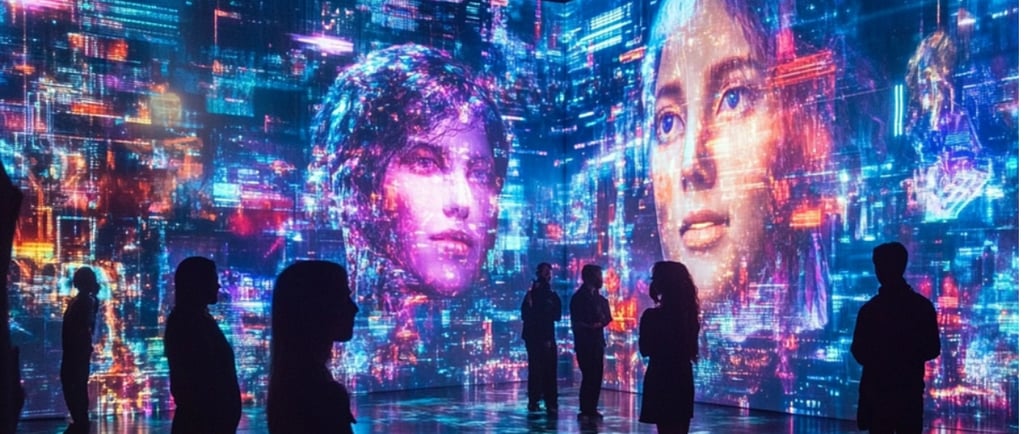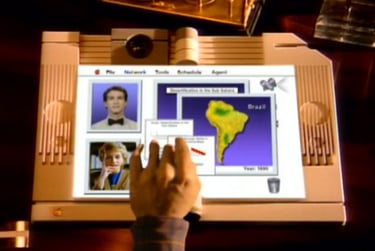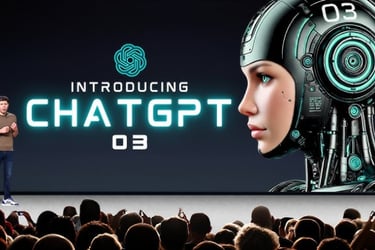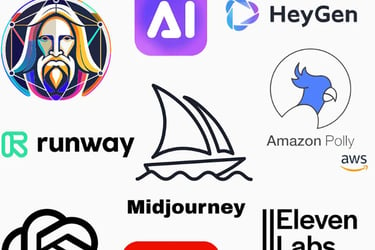AI Charm - a 40 Year Journey - 1984 to 224
2024 was a year of inspiring AI innovation, with it achieving lifelike abilities in so many areas. From ChatGPT O3’s genius math scores to Eleven Labs’ voices and Heygen’s streaming avatars, the advancements are remarkable. This article traces how it all may have started—with Steve Jobs having the original Mac introduce itself and Siri becoming our humble iPhone servant. Along the way, it explores milestones like Watson’s Jeopardy! win and DeepMind’s AlphaGo triumph. At each stage, especially with Gen AI, the fast-moving startups have delivered just as many surprises. Congrats to all of those founders and the next up-and-coming ones.
AISTARTUPSAGI
Edward Boyle
12/30/20246 min read


2024 was like 1984
The world in 2024 has been captivated—and at times overwhelmed—by the rapid succession of releases in the generative AI space. Every few months, AI leaders like OpenAI, Google, and Anthropic unveil groundbreaking advancements. But what is really amazing is how very small companies often have just as much impact as the tech giants, with MidJourney images, Eleven Labs voices, Heygen avatars, and Suno songs going viral with each upgrade. These releases are mostly streamed live on YouTube, with millions tuning in live to witness jaw-dropping demos, echoing the big annual Apple events and CES shows. At Escher, we often have the privilege of partnering with many of these small but impactful companies like these now, like we did with Apple at major releases for many years. And what has remained constant through the years is people's viral fascination with computers becoming more lifelike in their communication or creations.
The latest version of these releases was the 12 Days of OpenAI leading up to the holidays, with many viral moments including the feature film quality of the Sora video model, adding vision to ChatGPT advanced voice mode, and integration with Apple Intelligence across all iOS devices. But the most powerful was saved for the last day with a preview of ChatGPT o3, potentially achieving the holy grail of AGI—or human-like intelligence—maybe three years earlier than expected.
But this journey didn’t start with ChatGPT or even Apple’s Siri; it goes back to one of the most famous: the Macintosh’s unforgettable debut in 1984. This event showcased a vision for a more human-centered, intuitive approach to technology. So what has truly captivated us over the decades? It’s the moments when machines didn’t just function but felt alive, convincing us they could be more than tools—they could be companions.
First Words (1984–1993)
The Mac that Said Hello
In 1984, in a darkened auditorium in Silicon Valley, magic happened—a kind of magic that wasn’t conjured by wizards but by engineers and visionaries. A beige box called Macintosh cleared its digital throat and spoke, "Hello, I'm Macintosh. It sure is great to get out of that bag." The audience gasped, then laughed, then applauded. But the real magic wasn’t just the words—it was the personality behind them. Steve Jobs stood on stage, orchestrating a moment that would define the next forty years of computing. With the precision of a symphony conductor, he turned a lifeless box of circuits and code into something alive. It wasn’t just a computer; it was a companion with a voice, a sense of humor, and a hint of sass.
Knowledge Navigator and Newton, the First Personal Agent
CEO John Sculley picked up the human-like AI torch next with his and Alan Kay's great Knowledge Navigator concept piece. This video showed maybe the first streaming avatar helping two professor's collaborate on a climate change article while doing agent tasks like sending emails and booking appointments. I am not sure today's avatars can completely fulfill that vision yet, but this year we suddenly got much closer.
This was followed by Apple’s first handheld device, the Newton, which converted scrawled handwriting into digital text and helped to transmit some of the first chat messages. Early demonstrations were spectacular but marred by a 90% accuracy rate that led to comical autocorrect errors like we still get today. However, Newton pioneered the Personal Digital Assistant (PDA) category and laid the foundation for the iPhone.
Learning to Listen (2011–2015)
Siri: Your Humble Personal Assistant
The iPhone 4 launch in 2011 brought Siri, giving everyone an AI assistant in their pocket. Siri was an immediate hit with reliability, humor, and utility—like telling jokes or providing weather updates with a hint of concern—marked a milestone in natural conversation with machines. Siri being created by a small company and later bought by Apple was the start of another recurring theme in AI, where many of the most compelling advances are coming from fast-moving independent teams.
Watson: The Quiz Show Champion
Watson’s 2011 "Jeopardy!" victory showcased a machine parsing trivia’s subtle wordplay and responding faster than human champions. When Watson correctly answered "What is leg?" to a complex clue, it demonstrated context, etymology, and cultural comprehension. This was like the "student surpassing the teacher" inflection point that captured the world's attention.
AlphaGo: Teaching Machines Intuition
AlphaGo’s 2016 match against Lee Sedol revealed machine creativity. In Game 2, Move 37, AlphaGo made a move so unconventional that experts initially dismissed it as an error. Instead, it was a brilliant strategy that blurred the line between human and machine intuition. AlphaGo was developed by another originally small team from DeepMind that Google acquired and now is driving much of Google's AI development.
GenAI: Finding Its Stage Presence (2022-2024)
When ChatGPT Took Center Stage
OpenAI’s ChatGPT, unveiled on November 30, 2022, was more than a technical breakthrough; it was a cultural moment. In its first week, it recorded 15.5 million visits, testing conversational abilities that quickly became household staples. With 100 million users in two months, ChatGPT dwarfed previous adoption rates—in a small fraction of the 9–30 months of prior leaders like TikTok and Instagram. This demonstrated what a global phenomenon was just unleashed.
Eleven Labs: Digital Voices Become Human
Eleven Labs’ AI voices are the clear leaders that can whisper, laugh, and sing authentically. Their technology powers narrations and tutorials with the charisma of a seasoned presenter. And equally amazing, they achieved leading status with just 15 employees in Poland.
MidJourney: Images That Captivate
The top AI image creation program that many millions have fallen in love with is MidJourney by Leap Motion. It delivers stunningly high-quality, creative, and whimsical images that have been used for everything from lead magazine covers to late-night TV-show material. Remarkably, the company still consists of only about 40 people almost three years after starting, and it has been profitable since its first beta release.
Heygen: Streaming Avatar Agents
Similarly, Heygen’s avatars bring digital personalities to life with lifelike eye contact and gestures. One of the most stunning features is being able to train your own digital doppelgänger on a personal knowledgebase and have it attend Zoom meetings for you when double booked. They are also leading the way with about 40 employees, showing another area where the fast, independent team leads.
When Doctors Met Their AI Colleagues
In 2024, Hippocratic AI allowed healthcare systems to start making empathetic telephone calls to remind patients about screenings in multiple languages. Its voice was so human and engaging in genuine dialogue that it has much higher success rates than prior callers. The next step in healthcare AI is being taken by companies like Hygia Healthcare’s that are integrating streaming avatars with a wide range of healthcare use cases, from finding doctors to teleheath visits.
The December Awakening
o3’s Christmas Debut
All of these achievements were capped off on December 20, 2024, with what may have marked a watershed moment in AI’s journey to lifelike behavior. OpenAI’s ChatGPT o3 didn’t just understand commands—it displayed personality and charm. It joked with scientists, spun bedtime stories, and debated ethics with uncanny nuance. These abilities pushed AI closer to becoming thoughtful conversationalists, blurring the line between tool and companion.
Our New Digital Companions
From the inspiring "Hello" of the Macintosh to the awe-inspiring capabilities of ChatGPT o3, the journey of AI has been marked by transformative moments. While large players like OpenAI and Google have shaped the field, some of the most compelling advancements continue to come from fast-moving, independent teams like those behind Eleven Labs, MidJourney, and Heygen. These companies remind us of the power of small, innovative groups to make a global impact.
At Escher, we are proud to work alongside companies like these, providing strategy, fundraising advisory, and board-level guidance to help them achieve their goals. From our earliest days supporting Apple’s iconic product launches to today’s collaborations with top AI and climate-tech companies, we have always sought to be part of truly impactful ventures.
If you’re building the next great lifelike AI product and could use expert guidance or are looking to invest in one, we invite you to reach out. Together, we can turn your vision into reality and help shape the future of human-machine collaboration.








